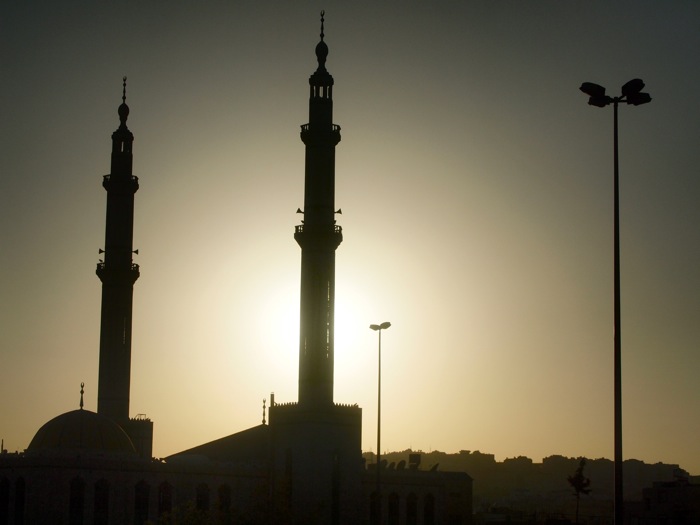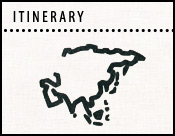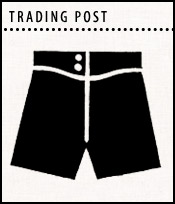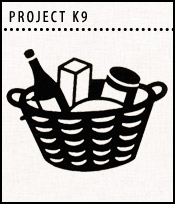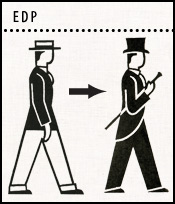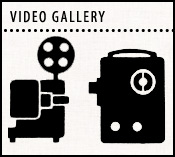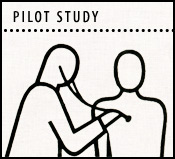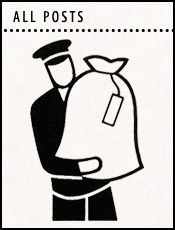October 10th, 2010
Jellyfish & Hidden French Fries in Byblos
The next morning we woke up and began furiously doing laundry in the bathroom of our room at the King George Inn in Jbeil, better know as Byblos, in Lebanon. Claudia was feeling much better, which was a great relief. She seemed glad to be joining in the activities again, scrubbing a pair of jeans furiously in the shower in her bathing suit. After cleaning, rinsing, and hanging up all the clothes that were not currently on our bodies, we began thinking about food and wheeling.
We had, during the great bargaining fiasco of last night, given up our rights to the generally included breakfast at the King George in favor of a reduced rate, so we needed to find something in town. Â King George himself strutted around the hotel’s entrance, tending to the garden in the front of the property and producing a nasal murmur into his mobile phone.
We found our bikes outside, where we’d parked and locked them, right in front of the great black Mercedes in the manager’s parking place. Someone had been courteous enough to cover them with a large gray cloth, perhaps to deter thieves.
It was as we were pulling the dusty great cloth off our bikes that I realized I had left my bathing suit in the room (you see, dear reader, we had plans to head to a beach again), so I excused myself to run back up and get it. When I attempted to unlock the door, however, I found myself unable to do so. Either the lock or the key had ceased to cooperate.
So we brought the proprietor’s son, Tony, into the picture, and he too struggled with the door, eventually giving up. We were locked out of our room, with my bathing suit inside, but he assured us he would have the problem solved by the time we got back from our wheel. So we pulled the cloth off the cycles, and figuring I could just buy another suit or go in my ExOfficios, hopped on my Speed TR, whooshing down the hillside and back into the city.
Inside town, we wheeled right by the Librarie Al Jihad. “Jihad,†Claudia explained to us, in reality has a totally different meaning than the whole Alquaida-ized version with which we are familiar in the west.
It refers more to an interior battle for enlightenment, she explained, which sounded good to us, and fit very well with the idea of libraries. So we rode on, giving it the AsiaWheeling-well-named-library seal of approval. As we made our way deeper into town, the call of our growling stomachs began to grow in strength, and we began, with increasing mania, to dash in and out of restaurants in search of food.
We ended up finding it at a sort of down-home snack joint, where we were able to a get a large plate of French fries, some hummus, and a few smoked fish wraps. The food was tasty, but left us feeling very heavy, sluggish, and a little sick.
There is a Lebanese practice of sneaking French fries, as ingredients, into dishes where you wouldn’t find them. The result is often tasty in the short term, but an uncomfortable belly bomb in the longer term. We figured there was no better cure for the heavy greaseball stomach and sluggishness than wheeling though, so we climbed back on the cycles and continued exploring, albeit at a slightly slower pace.
Soon we came upon the seaside, where just as in Beirut, crystal clear blue Mediterranean water, lapped invitingly against a coastline scattered with hotels, resorts, and clubs. Interested as usual in the people’s beach, we wheeled on, eventually to be rewarded by what looked suspiciously like a public beach.
It was blazingly hot that day, and we were all too happy to spot a small convenience store. Our previous efforts to buy water in this city had been met with Tokyo-esque pricing, and similarly Japanese volumes. But this place looked a little more down home, and to be honest, we were getting so thirsty that we would have paid whatever we had to. We haggled a decent deal on six two-liter bottles, and as we were leaving, we noticed a large system of closed circuit televisions and cameras, which allowed the proprietor to keep an eye on the ice cream cooler outside. When we asked about the elaborate system, she explained that people had been stealing from her ice cream cooler. “So you’re saying the ice cream is not just free?†Scott joked.
“Nothing is free in Lebanon,†she said with a shocking deadpan. And with that, we made awkward goodbyes and climbed back on the cycles.
As we were wheeling down to investigate more closely, we ran into a Lebanese man who lived in Philadelphia. We spent a while chatting with him. He was far from the only foreign Lebanese in this country. Lebanon sports an external population of over 10 million, living in other countries all over the world. And not only do these Lebanese send money home to their families in Lebanon, but many of them come home to visit for the summer.
This might explain, at least in part, why we were finding Lebanon to be so startlingly expensive. During the summers, at least, it was filled with all the affluent Lebanese from foreign countries coming back home to flash a little.
Meanwhile, we had found a good spot at the beach, and Scott and Claudia had used a nearby seafood restaurant as a changing room. I just took my pants off near the water, hoping I was not scandalizing the populace too much. Then, leaving our stuff in a great trusting pile, we headed off into the blue water. We swam out, away from the coast, enjoying the cool of the water. It had been startlingly hot, and it felt amazing to be in the cool blue sea.
Just then a chiseled and well tanned man in a row boat came over. He explained to us that we had better get back to shore, for the water here was filled with jellyfish. Some of them were really big, he explained, throwing his arms out dramatically.
It was then we noticed that, indeed, none of the other beach goers seemed to have ventured out this far. So we began to swim back. And the rumor proved true, for as we swam, I began to notice stings, and then Claudia got struck as well. Then I caught a really bad one on my leg. We all began swimming faster and eventually reached the beach running back to our pile of things, with yelps and hollers.
We were quite happy to be on dry land again, and wiled away the next few hours reading about the Lebanese economy on the wiki reader, and singing songs on the ukulele.
That night, we returned to the hotel, and called a great meeting of the AsiaWheeling field team. We needed to reevaluate our plans. Lebanon was proving startlingly expensive, devastatingly touristy, and for one reason or another, we felt a pull to move on. With the marked exception of our meeting with Mueen and the Red Bull team, our interactions with the locals had been some of the most mediated, most predatory, and least pleasurable of the entire trip. The Lebanese food that we had looked forward to turned out to be a choice between swanky $20-per-plate type places, or cheap greasy street food, which consisted mostly of hidden French fries.
Frankly, I was fed up. I didn’t feel welcome. Furthermore, I felt that the way to be welcomed was to come and spend a lot of money. I thought back to the humble little city of Genshui, in southern Yunnan, where we had been taken under the wing of that restaurant owner, and continued to return back to his shop for more feasts and long conversations, to meet his friends and family, to be brought into his life. And that fellow didn’t even speak English.
Everyone here spoke English. Despite that, for the first time in six months of rambling, we were consistently unable to connect with the place in anything more than either the most superficial or most intellectually mediated way. I know, I know, dear reader, this is an atypical stance for your humble correspondents to take. And please don’t get me wrong. Lebanon is a beautiful country, just bursting with natural wonders and rich history. But I just don’t think it’s the place for AsiaWheeling.
It felt artificial, manufactured, and mediated. The men of this country are engaged in a never ending cycle of competition to see who has the fanciest car, who frequents the coolest night clubs, who has the best pair of acid-washed designer jeans, or the newest sunglasses. The women are so painted, so packaged, and so modified as to appear only partially organic life forms.
In an effort to gain Internet access, we inquired with the staff of the King George whether it would be possible to plug in our laptop to their network.  After Scott was shown various dead Ethernet connections on multiple floors of the hotel, Tony, George’s son invited him to sit on the steps outside their personal residence on floor two.  As the Internet trickled wirelessly, syncing emails and uploading posts to AsiaWheeling.com, shouts and hollers of domestic dispute flowed forth from the residence.  Business with family seemed tough, especially the hotel business.
Lebanon was an important place to visit, an awesome cultural and economic spectacle, but after about an hour of discussion, we decided it was time to go back to Syria, where we felt at home.






















































































































































